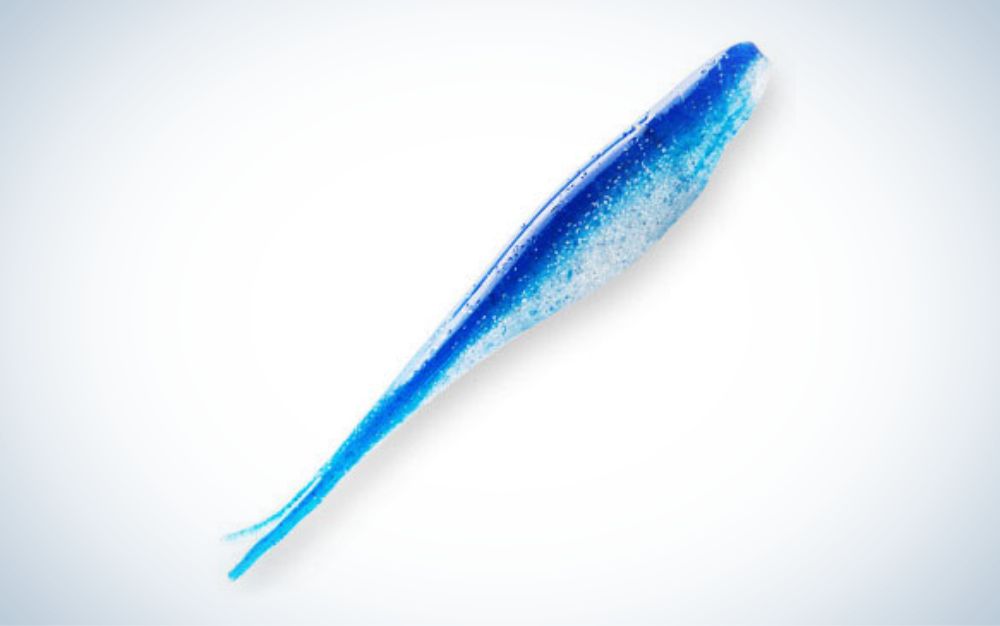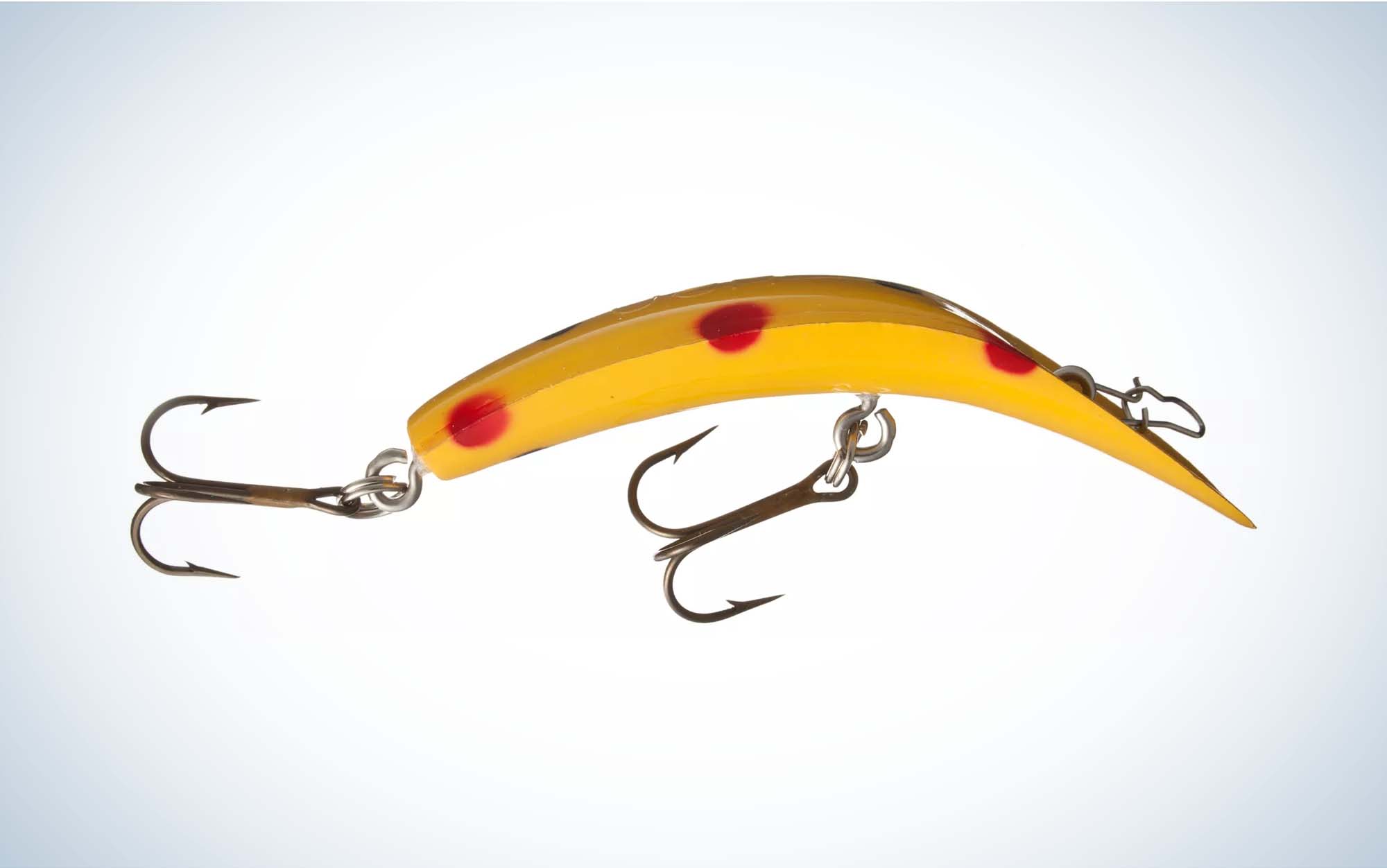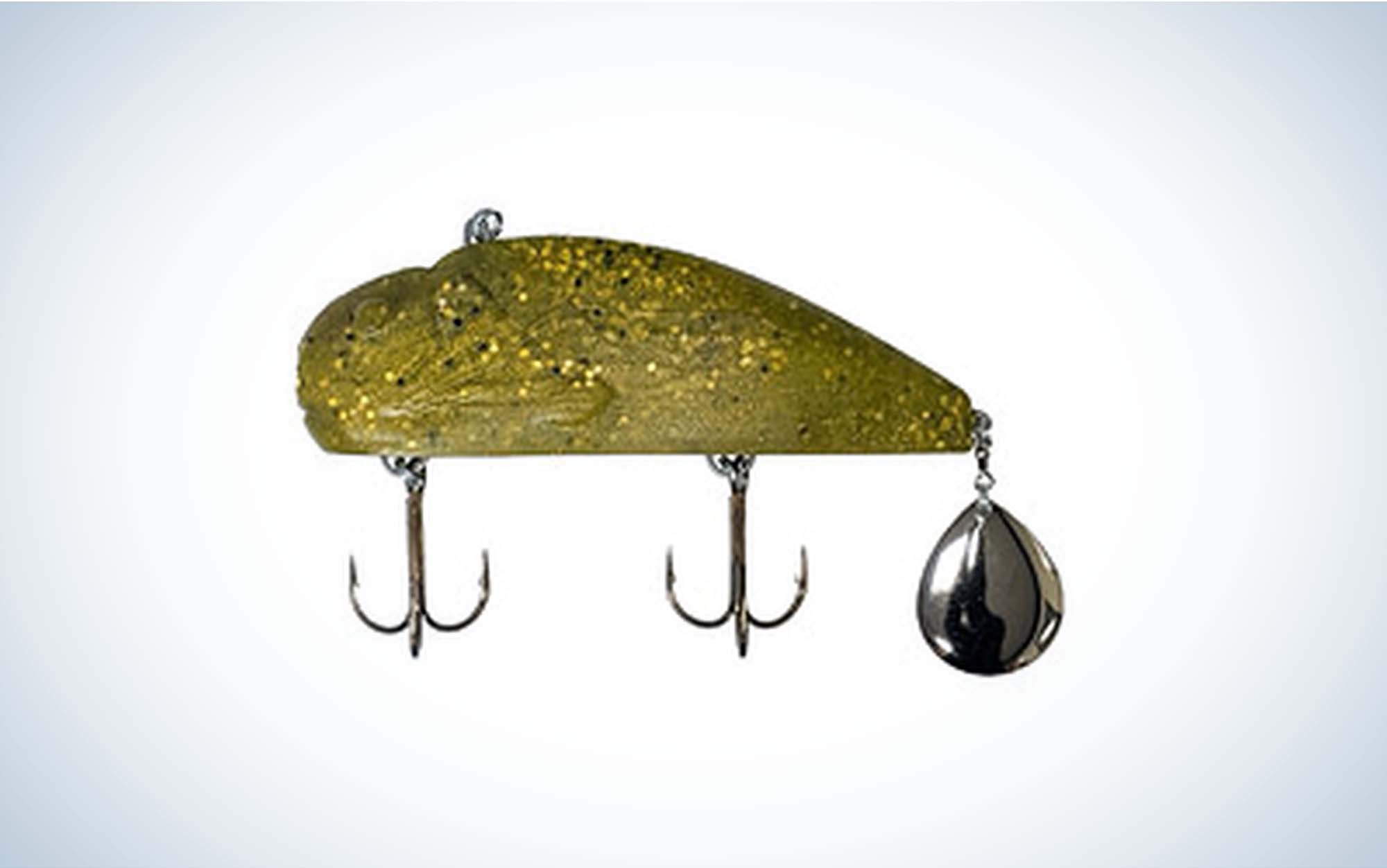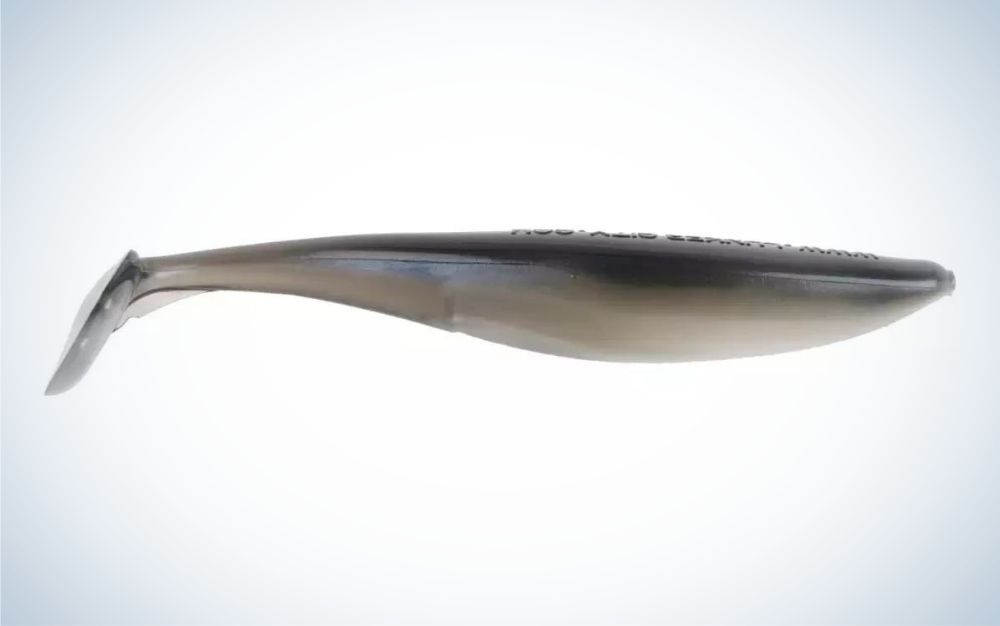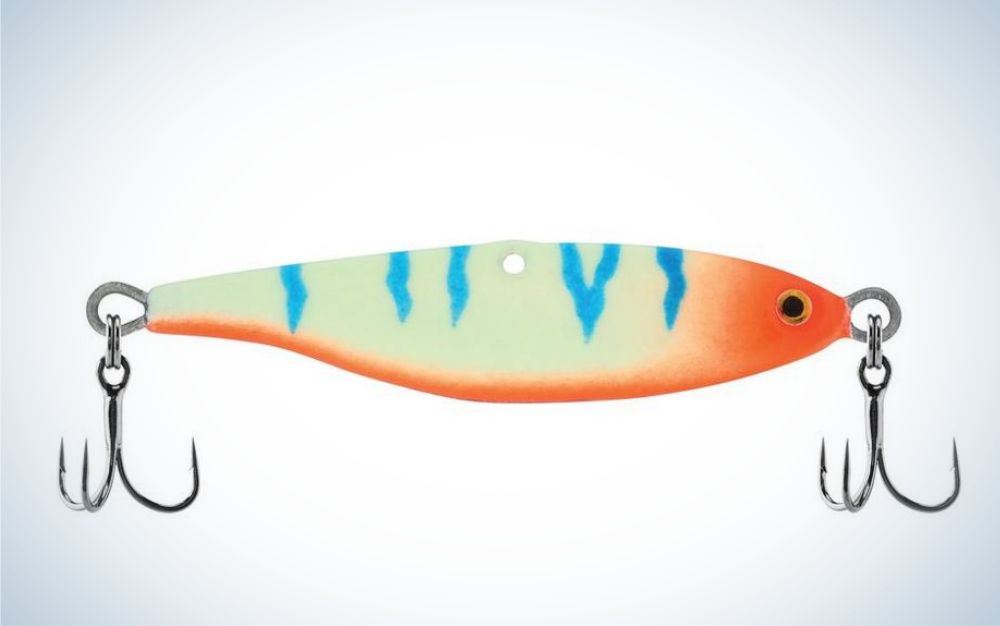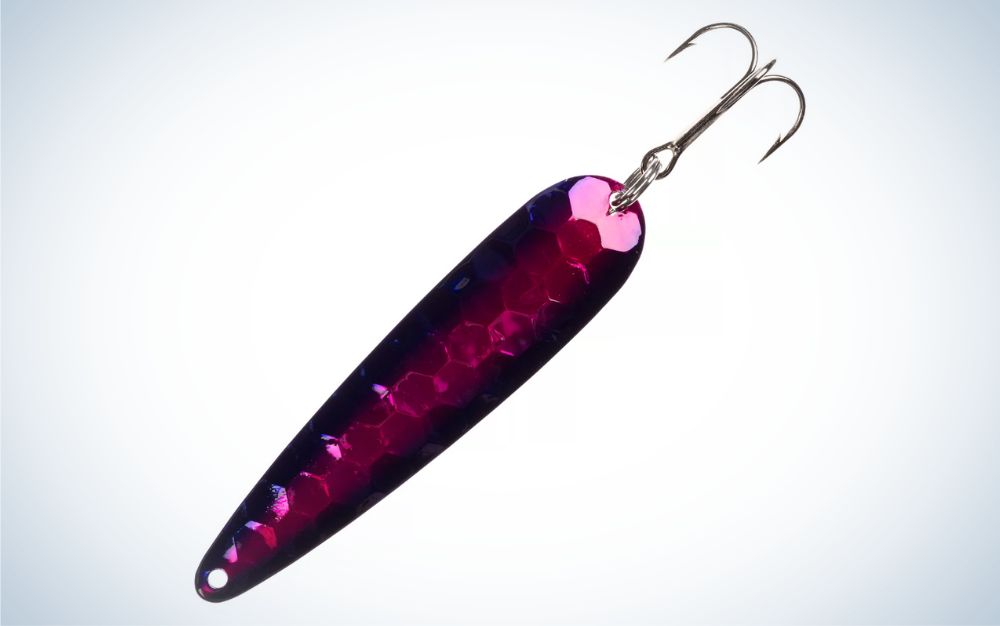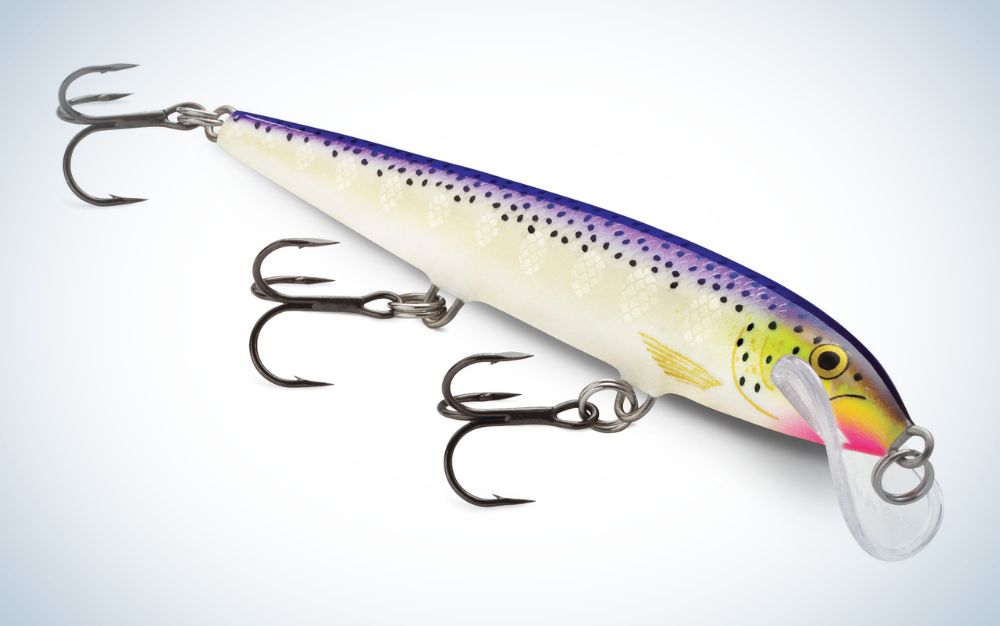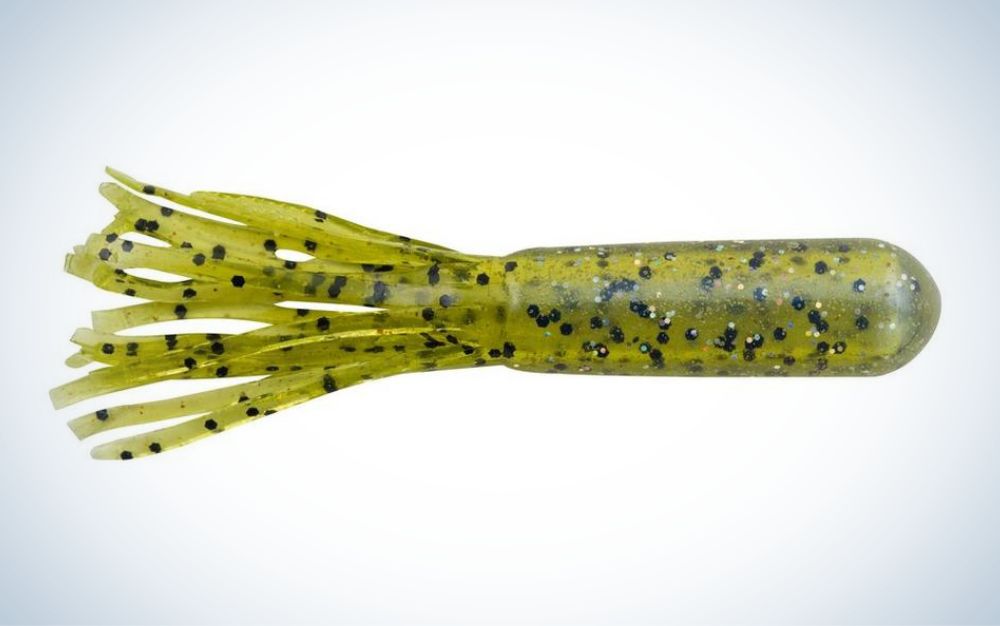We may earn revenue from the products available on this page and participate in affiliate programs. Learn More ›
Updated Mar 21, 2023 4:55 PM
How can you not respect the lake trout? A potential goliath of a freshwater predator, the laker is a stunningly attractive creature—hard charging, typically delicious and a survivor of every conceivable calamity, from overfishing to environmental shifts to invasive species. And yet, inexplicably, the ancient, original Great Lakes cousin of the char (Salvelinus namaycush) remains rather an afterthought in many of its North country haunts. When fishing for salmon or walleyes or other species fall short, lake trout seem to always be there to take up the slack. In short, lake trout eagerly eat lures and provide some of the most active sport available, particularly in the coldwater months.
Like many lake trout fans, I grew up trolling the Great Lakes and large mountainous reservoirs with downriggers, diving plugs, spoons and other flashy lures to cover water. But the little secret is, lake trout respond especially well to vertical or casting presentations already familiar to the bass and walleye brigade. Lake trout love to chew soft plastics. And as we continue to discover, dropping a soft tube, jerk shad, or paddletail swimbait in the right vicinity nearly always elicits a strong predatory response—made even more exciting by the prospect of a 15-, 20- or 30-pound fish that can surpass 50 years of age. If you want to catch one of these giants, you’ll need the best lake trout lures:
How to Choose a Lake Trout Lure
One of the first steps in learning how to catch lake trout is lure selection. The major considerations affecting lure choice for lake trout include water temperature, fish depth, and specific location. In spring, when water temps range from the mid 40s to mid 50s, lake trout may cling to shallow rocky structure where casting with jig/plastic combos, crankbaits, or spoons can all elicit strikes.
As waters warm into the 60s and 70s in summer, lake trout typically pursue pelagic baitfish such as herring (ciscoes), smelt and alewives into deeper main lake basin areas. Here, trolling for suspended fish—often near the thermocline— remains the high-percentage approach. Downriggers and spoons or plugs canvasses more real estate and gets your lure in front of more fish per hour. In late summer, fall and winter, when lake trout visit submerged islands topping out from 20 to 80 feet of water, vertical jigging with a variety of lures, such as soft plastic flukes, tubes or bladebaits offer a precision presentation for covering smaller zones. Late fall also finds lake trout spawning on relatively shallow rocky structures—or near river inlets.
The Best Lake Trout Lures: Reviews & Recommendations
Best Overall: Z-Man Scented Jerk ShadZ
Key Features
- Versatile minnow / baitfish profile matches lake trout forage
- Darting minnow action induces following lake trout to strike
- Sizes: 4, 5, and 7 inches
- Scented with 100-percent natural Pro-Cure Super Gel
- Must Have Colors: Bad Shad, Smelt, and Shiner
Pros
- Soft, highly durable ElaZtech material stands up to multiple violent strikes and fish catches per bait
- Buoyancy of bait provides a natural, horizontal baitfish posture in the water—especially when rigged on a jighead.
- ElaZtech material absorbs and retains oil-based scents, like Pro-Cure for extended periods.
Cons
- ElaZtech bait material cannot be stored beside traditional PVC soft plastics
While far from a traditional trout lure, the Z-Man Scented Jerk ShadZ’ was discovered by bass and walleye anglers who realized they were catching impressive numbers of sizeable lake trout, even along shallower structure. In recent seasons, we’ve been rigging the bait on a ¼- to 1/2-ounce jighead, such as the Z-Man Finesse EyeZ or HeadlockZ HD jighead, dropping the lure on suspended or deep trout hunting hard-bottom points or humps.
The opposite of monotonous trolling techniques is actively casting and vertically jigging with bass-style, soft plastic jerkbaits. That technique has become increasingly popular across the lake trout’s range—from clear Rocky Mountain reservoirs and Canadian lakes to the Great Lakes and beyond. Among countless soft jerkbait options, Z-Man’s soft, buoyant, durable and non-toxic ElaZtech Jerk ShadZ has risen to the top of many anglers’ preferences. I first discovered the allure of this bait while ice fishing for lake trout on Lake of the Woods, Ontario. Since then, I’ve learned the lure works equally well when cast from a boat.
Rigged on a 90-degree jighead (eyelet positioned perpendicular to the hook shank) the Scented Jerk ShadZ hovers in the natural horizontal posture of a live baitfish. One great game plan is to locate lake trout on sonar, dropping the lure down to their position, typically stopping it 5 feet or so above the fish. Often, a trout will race right up and smash the Jerk ShadZ well before it reaches bottom. If fish follow but fail to bite, I’ll give the bait several small twitches, lifting it several feet, compelling trout to eat. Or, go even more aggressive, ripping the bait violently before stopping and letting it hover in that natural horizontal position. Strikes are usually rapid and rod-jarring.
Best Trolling Plug: Yakima FlatFish
Key Features
- Offered in 14 sizes, from 1- to 6-inches
- Banana shape produces strong vibrating, wide wiggle action.
- Must Have Colors: Firetiger, Bleeding Frog, and Rainbow Trout
Pros
- Hard wobbling, vibrating action
- Available in countless color combinations, including the perennially popular “Frog” pattern.
Cons
- Requires added weight to reach depths greater than 20 feet.
Legendary for its propensity to catch big fish, Charlie Helin’s original FlatFish was designed to produce an enticing wide wiggling action when trolled at slow speeds. As speed increases, the lure gives off a decided “sonic thump” that draws lake trout from afar.
For the truly enormous lake trout of the far north, a 6-inch FlatFish trolled across shallow 20-foot rocky outcrops remains one of the most reliable methods available. Regardless of whether you’re flatline (no added weight) trolling the lure or pulling it behind an inline sinker or downrigger in much deeper water, one key to the FlatFish’s success is assuring its nose periodically scrapes across rock and other hard-bottom substrate. Bottom contact makes the lure sashay and move in all sorts of random directions, often triggering a positive predatory response.
For added attraction, some anglers sweeten the offering by adding a small baitfish fillet or nightcrawler to the lure’s trailing hook. Guides and charter captains also occasionally wrap the lure with a thin triangle shaped fillet of sardine or herring, using light monofilament or elastic thread, finishing the wrap with several half-hitch knots.
Most Versatile: Bondy Bait Junior
Key Features
- Weight: 5.4-ounces
- Baitfish profile
- Tail spinner blade
- Must Have Colors: Whizzard Shad, Space Monkey and Pearl
Pros
- Durable soft plastic material holds up to numerous big fish.
- Quick-darting, swimming action triggers fish from a distance.
- Ideal for deep water
Cons
- May be too large for lakes with smaller lake trout only.
The 5.4-ounce Bondy Bait Junior can be cast and retrieved, horizontally, or dropped overboard for deeper lake trout discovered with sonar. Its extra weight keeps the angler continuously in touch with the lure, which also shows up well on electronics. Strikes are typically sharp and aggressive—and the lure attracts bites from the largest specimens—making it a logical choice in many waters. Its propensity to elicit strikes from bonus big pike, muskies and walleyes adds to the Bondy Bait’s allure.
Originally intended as a muskie lure, intelligent anglers have gradually discovered the fast-sinking, darting action of the Bondy Bait for big lake trout. Particularly for pursuing trout in deep, clear Canadian lakes or mountain reservoirs. The Bondy plummets quickly to 30 feet to get into the strike zone quickly. Great Lakes guide Jon Bondy offers several sizes of the Bondy Bait, including the original 7.5 inch, 7-ounce size. This overlooked lake trout lure is offered in a ton of different colors, each armed with twin 3/0 treble hooks.
Best Soft Plastic: Lunker City SwimFish
Key Features
- 5-inch baitfish profile body
- Subtle baitfish patterns match prevailing lake trout forage.
- Must Have Colors: Alewife, Ice Shad, and Fire Perch
Pros
- Soft yet tough composition
- Smartly designed paddletail kicks at all retrieve speeds
Cons
- Relatively expensive at over $1 per bait (MSRP $4.99 per 4-pack)
This is big bait for catching for catching giant lake trout. Featuring a true baitfish shape and subtle, fluid swimming motion, the Lunker City SwimFish remains one of the best built paddletail swimbaits available. Swim it through shallow water on a weighted swimbait hook or a 3/8- to 1-ounce jighead for a deeper presentation and added body wobble on the retrieve.
Among an excess of paddletail swimbaits available today, Lunker City’s SwimFish stands apart for its ability to produce bites from the largest predators. Fished slow along deep structural edges or faster across shallow water, the SwimFish retains its true swimming motion—subtle paddletail kick and slight body wobble—without over-exaggeration.
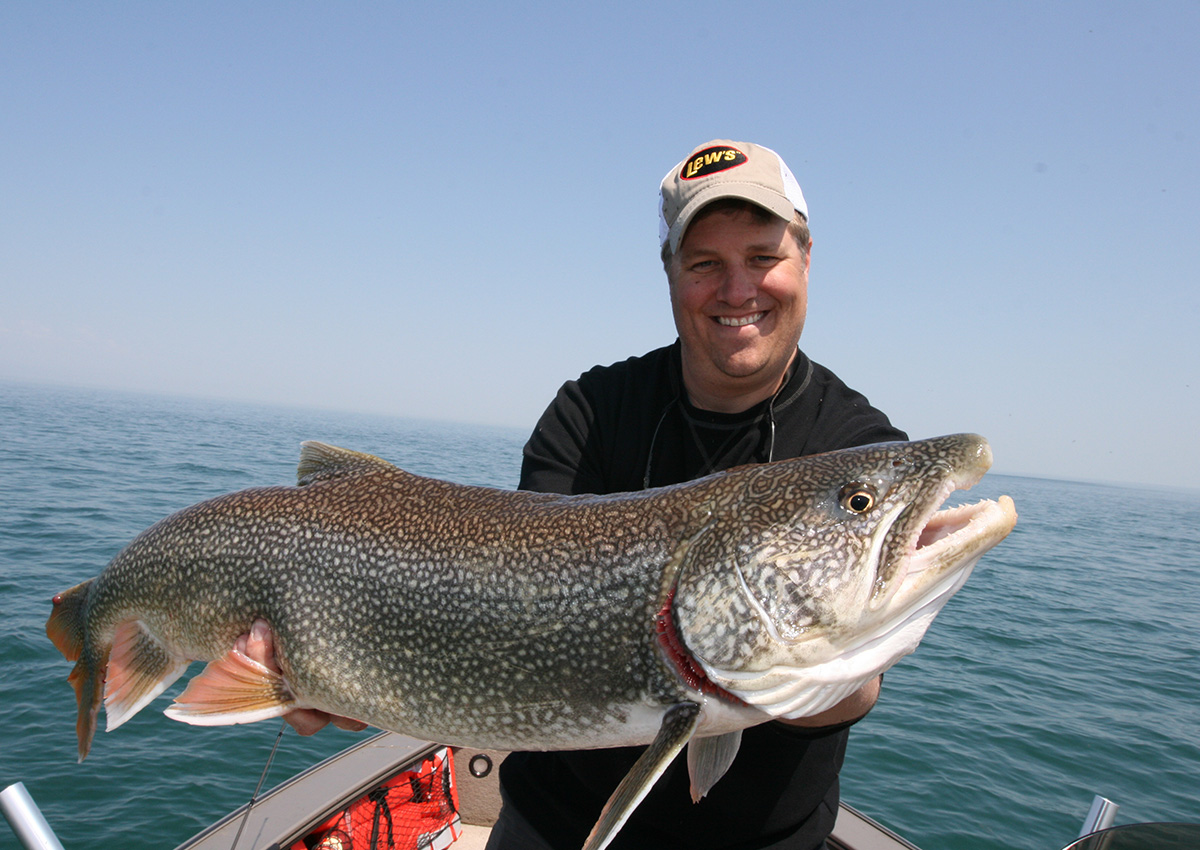
This is one of the first great paddletail swimbaits I fished for lake trout many years ago, and it remains a favorite today. Rigged on a ¾-ounce Owner Saltwater Bullet jighead, the SwimFish can be counted down and slow-rolled to at least 20 feet, especially with 20-pound test braid and a long fluorocarbon leader. To trigger following trout, give the lure one or two hard rips to make it dart right or left. In clear lakes with ciscoes, smelt or similar forage, the alewife pattern remains an appetizing choice.
Best Jigging Spoon: Berkley Vibrato
Key Features
- Innovative mid-body line tie creates a unique pull point and realistic horizontal flash on the rise and fall.
- Designed by Patrick Sébile.
- Updated color patterns by Berkley
- Weight: 1/8-ounce to 1-ounce
- Length: 1 ½ to 2 ⅝ inches
- Must Have Colors: Holo Greenie, Golden Shiner and White Perch
Pros
- A highly balanced lure that—unlike traditional blade baits—rarely becomes ensnared in its own hooks and line. (Use heavy, stiff fluorocarbon for best results.)
- Fast rate of fall with optimal flash and subtle vibration
Cons
- May be too small (length) or weight for certain trophy lake trout situations
Originally intended as a saltwater lure, the Vibrato has proven its mettle with many freshwater predators, lake trout prominent among them. Unlike most blade baits that resemble shad, the Vibrato features a slender cool-water baitfish profile, matching herring (ciscoes), smelt, shiners, and baby trout—all preferred prey species of trophy lakers.
Among many original Patrick Sébile designs, the Vibrato has flown largely under the radar among other lures in its (bladebait) category. Its long, slender profile stands apart from traditional bladed baits, which typically resemble deeper bodied shad. Anglers have also often mistaken the Vibrato for a horizontal spoon style lure. But make no mistake, this is a dynamic vibrating, flashing lure that shines in 10 to roughly 50 feet of water—cast horizontally and zipped along bottom or vertically jigged.
To make the most of the lure’s performance, consider fishing the Vibrato on 15- to 30- pound braided line and a 4- to 10-foot fluorocarbon leader of matching break-strength. While many anglers make the mistake of retrieving the lure with long, fast rips of the rod, I believe the Vibrato induces most strikes from lake trout when dropped to bottom (or a certain depth of suspended fish) and given one short, fast pull at a time, between protracted pauses. Done correctly, you’ll detect no more than two to four fast thumps of the lure through your rod tip. Strikes often occur as the lure pauses, just after you finish making the lure dart.
Best Trolling Spoon: Wolverine Tackle Silver Streak Spoon
Key Features
- Three sizes: 3-1/4- to 4-3/4-inch
- VMC treble hook & stainless-steel split ring
- Dozens of colors available.
- Must Have Colors: una Melt, Glow/Michael Jackson and Smurf.
Pros
- Dozens of colors available, including UV patterns.
- Heavy enough for casting or trolling.
Cons
- Not available in a 5-inch plus size for lake trout feeding on larger forage.
The Silver Streak is a classic thin, slender spoon profile, stamped from pure brass and plated with silver, gold, copper, or black nickel to hold up to the abuse of deepwater predators. The Silver Streak, like most great trolling spoons, swims with that alluring tail flip and flash action that compels interested trout to snap.
Run behind a downrigger, three-way rig or a dodger/flasher to spoon combination, the Silver Streak simply catches fish—everything from lake trout, steelhead, king and coho salmon to walleyes. Trolling speeds of 1.8 to 3 mph or even faster in summer produce most of the action. Each day, lake trout can show decided preferences for trolling speed, so experienced anglers usually experiment with speed until they find a range the fish prefer. Moreover, veteran trollers mix and match a variety of spoon colors—routinely running six or more lines in a trolling spread—to give fish an opportunity to display their choice du jour.
Best Crankbait: Rapala Scatter Rap Minnow
Key Features
- Length: 4-⅜ inch
- Scatter Lip Design yields erratic swimming action.
- Balsa body
- Must Have Colors: Rapala Blue (with silver/white belly, Purpledescent, and Custom HD Live Smelt
Pros
- Proven Rapala Minnow profile and action—tight, subtle shimmy with the addition on random, side-to-side darting motions
- Slender minnow profile mimics the baitfish most often targeted by lake trout.
- Trolls smoothly at up to about 4-mph (faster speeds can trigger more trout).
Cons
- Balsa construction not as durable as ABS
- May require replacing with beefier hooks for jarring strikes from big fish.
While Rapala’s Scatter Rap series remains somewhat overlooked relative to the company’s classic crankbait offerings, the Scatter Rap Minnow’s random, erratic juking action produces exceptional results when trolled behind a downrigger ball, three-way rig or leadcore line for deepwater lake trout. With 20-pound braided line, the lure also dives to at least 10 feet (or deeper with 100 feet or more of line out), ideal for early season or late fall trout running shallower structure.
Expert lake trout anglers know that lake trout routinely follow trolled lures for substantial distances without striking. Typically, without some sort of added dimension of movement—lure stops, starts or sideways jukes—lake trout often hesitate to eat straight-retrieved lures. The special lip design of the Scatter Rap Minnow compels the lure to randomly dart left or right, reminiscent of a fleeing preyfish. Many times, particularly when trolled through open water, such an “evasive” action, as Rapala terms it, can be the deadliest of all strike triggers for big lake trout, as well as salmon and other predators.
Early in the season or late in fall when lake trout frequent shallow structure, I’ve wielded the Scatter Rap Minnow with a medium-heavy power spinning tackle, casting to trout with tremendous success. A straight, steady retrieve activates the lure’s erratic action—or add occasional rod tip jerks to accentuate the fleeing prey effect.
Best for Ice Fishing: Berkley PowerBait 3.5-inch Power Tube
Key Features
- Imbued with Berkley’s proven PowerBait scent formula.
- Lengths: 2 1/2, 3 ½, and 4 ½ inches
- Must Have Colors: White, Lucky Penny and Smoke Gold
Pros
- PowerBait formula appeals to a lake trout’s acute senses of taste and scent
- Simple, generalist bait profile imitates a variety of lake trout foods.
Cons
- Lure’s tendency to spiral on the fall can create line twists in deep water.
A classic wintertime lake trout lure, the Berkley PowerBait Power Tube appeals to lake trout via scent, softness and its constantly quaking tentacles.
There’s something undeniably magic about a plain white or gold colored tube bait, particularly for lake trout through a hole in the ice. As predators with a decided preference for cold water, lake trout can be incredibly active during the frozen water period—and a tube remains the finest of all presentations.
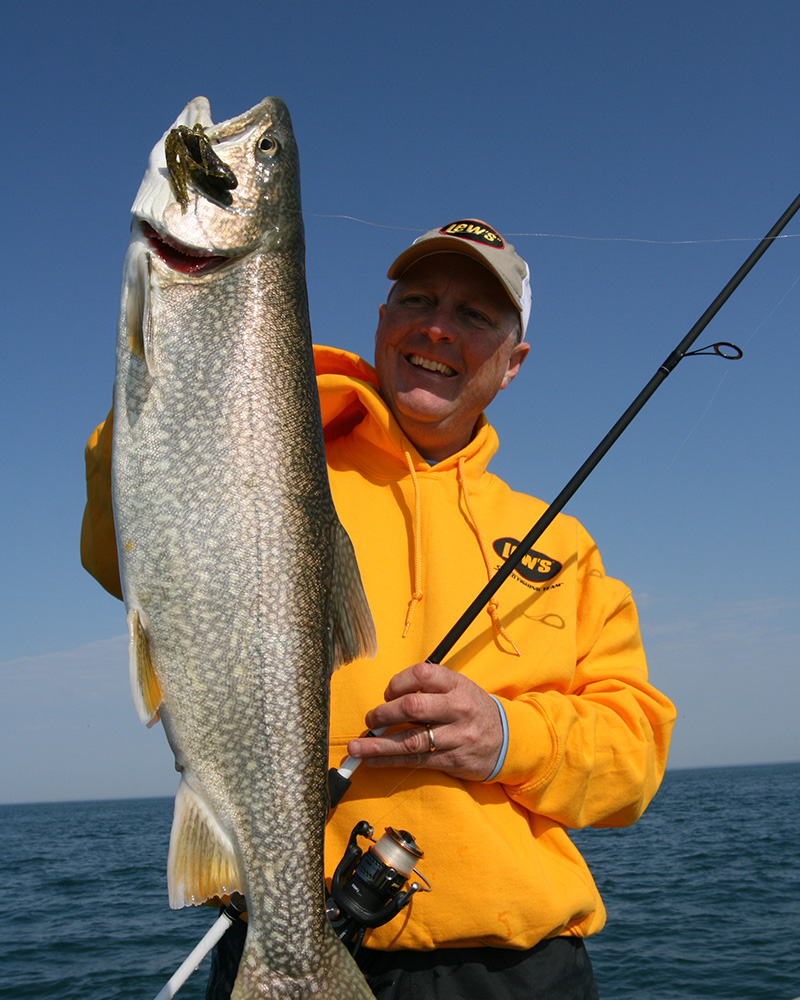
I first recall catching loads of big wintertime lake trout on a 3/8-ounce jighead and 3-½ inch tube in the late 1980s on Colorado’s Lake Granby. Fished beside the more traditional spoons and airplane jigs, the tube was a revelation, especially when packed with scent-soaked with cotton balls. Today, every good ice lake trout angler knows about the allure of these baits, particularly scented PowerBait Tubes.
Thread one onto a 3/8- to 1-ounce jighead with a keeper barb or insert the jig into the tube’s body, poking the eyelet through the plastic material. To achieve a pronounced spiraling effect on the drop—which can trigger more fish—poke the jig eyelet out of the bait an inch or two back toward the tail, creating an open pocket in the bait’s head and an altered center of gravity. Anglers also occasionally poke a scent-soaked cotton swab into the hollow body cavity before inserting the jig.
FAQs
Q: What colors do lake trout like?
Most lake trout fisheries contain clear water and pelagic forage such as herring, smelt or alewives, as well as kokanee salmon and small trout. As such, natural baitfish patterns with dark backs and white/silver sides always produce. Often, adding a bit of blue, green or chartreuse can also induce bites.
Q: How deep do lake trout live?
This is all relative to the body of water. On an inland lake or reservoir, lake trout commonly run 20 to 60 feet in spring and summer, occasionally shifting to 80 to 100 feet—if forage and ample dissolved oxygen is available at those depths.
In Great Lakes like Superior and Michigan, lakers often haunt depths to 100 feet or more. Interestingly, a deepwater lake trout variation known as the Siscowet haunts Lake Superior, commonly swimming 300 to 600 feet of water. The Siscowet, whose high fat body content is specially adapted for coldwater living, has been caught in some of Superior’s deepest sections at over 1,000 feet.
Q: What lure catches the most trout?
In the Great Lakes, where trout are a common species, many of the fish are taken on spoons and diving plugs, typically trolled behind downrigger balls. On inland lakes, soft plastic flukes, swimbaits and tubes rigged on 1/4- to 1-ounce jigheads can be exceptionally productive, especially when cast to shallow water or vertically jigged on deep humps for lake trout spotted on sonar.
Why Trust Outdoor Life?
Since 1898, OL has been a leading authority in testing and reviewing hunting gear, fishing tackle, guns and shooting equipment, and much more. We have more than a century-long history of evaluating products, and we’re now bringing that expertise to online reviews. Our editors are experienced outdoorsmen and women, and most importantly, we’re trained journalists. We prioritize field testing and objective data when reviewing products. We conduct interviews with gear manufacturers and engineers as well as outdoor experts so that our readers have an understanding of how and why a product works—or doesn’t.
Advertising does not influence our gear reviews and it never will. While we always focus our coverage on standout products—because we want our readers to be aware of the latest and greatest gear—we also cover the flaws and quirks of any given product.
Final Thoughts
Lake trout remain one of the preeminent, though often ignored North American freshwater fish—a true native species that first appeared after the last great ice age, as glaciers began receding. According to A.J. McClane’s New Standard Fishing Encyclopedia, the lake trout is the only freshwater species that ranges into the far north of Canada and Alaska, but that does not extend westward across the Bering Strait into Siberia. It’s an interesting mystery, given that every other freshwater fish whose range approaches the Bering Strait has succeeded in crossing over. Even today, scientists remain mystified.

